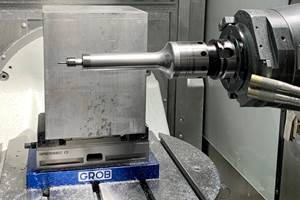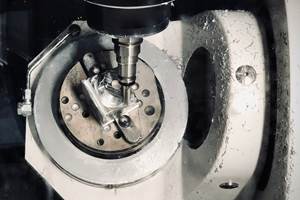How I Made It: Aneesa Muthana
Aneesa Muthana grew up helping out at her parents’ Chicago grinding shop before striking out on her own in the ‘90s. When business slowed down dramatically, she embraced change and built her machine shop into a modern facility using Swiss-type CNC machines.
Share





I was raised in the industry. My parents came from Yemen back in the ‘60s. My father worked at a machine shop in California before moving to Chicago. Like many immigrants, they saved every dime so they could open up their own business in 1981: M&M Quality Grinding. My brothers were teenagers, and I was 11 years old.
The joke is that some girls had Barbie dolls, and I had a centerless grinder. I was cleaning the shop, cleaning the tanks, helping with the shop. My brothers and I would be in the back seat, and when a truck would drive by with some steel rods we would write down the name on the trailer. Sometimes we would make calls — I remember cold calling places as a little girl, and my brothers did the same. And whoever got the business was excited. It was how we spent our family time, and looking back at it now at age 55, I have no regrets. I learned so much at a young age.

As I grew up and became a woman, I didn’t see sustainability for myself in the family business — not because of my family, but because anyone outside our four walls that would come in. Whether it was a new employee or a truck driver, they would come in and ask, “Where’s your brother?” or, “What would you know?” “Don’t worry your pretty little head about that.” I honestly laughed it off at first, but I was just unable to be productive. I think it came to a head one day when my brothers were not in the office and I had to call the shots. Every time I tried to take an inch forward, I would get pushback. And in my mind, I really didn’t understand it. I didn’t know how male-dominated the industry was because I was only in my four walls with my mother working right beside me my entire adolescence. I saw that there was no way I could navigate through it, so I told my family I was leaving. The joke was that I would come back, and I said to my brothers I would learn how to say, “Do you want fries with that?” before I came back to the family business.
Fast forward, my uncle wanted to open his own grinding shop. He had also worked for my dad back in the day and I had a very good relationship with him, but I didn’t want to compete with my family. Although I was 23, a single mom with two very young children, I knew I could figure it out. So I told my uncle we’d do part grinding, but we’d focus on machining, and that’s how I joined Pioneer Service in 1993. My uncle was my silent partner from day one.
Together, we built the company. We had Brown & Sharpes and Davenports. We had a lot of grinders, but we did piece parts, not bars, because my family was strictly bars. We would also solicit our competitors, who would send the parts they machined so we could grind them. I was wearing so many hats, back in the ‘90s and 2000s, so we expanded the team.
And then in 2012, we lost 90% of our business. A company bought up our top five customers, and as a small machine shop we unfortunately weren’t as diversified as we should have been. Looking at it in hindsight, I remember trying, but then you get a big order and you have enough work on your machines. You're in your own circle and you're not really learning anything. We didn't learn about new technologies. When I would hear CNC, I'd cringe. Fast forward, and we had to figure this out because failure was not an option. I was not going to close the doors. I was not going to send my employees home. I was forced to lessen the hours, but I wasn't going to lay people off. We didn’t, and we learned that we had to go into CNC.
We tried turning centers for a couple of years, but we weren't successful. We had a few jobs here and there, but we didn't have the support that we needed. The business was slowly going away, and so I did some research. I was taking courses and going to these events and conferences. I was taking notes and photos, and I would come back so overwhelmed. Then I learned about Swiss machining through YouTube. Not a competitor, but YouTube. I walked into the shop and said, “We're going into Swiss.”
They thought I was going crazy. They thought I had totally lost it, so I told them there's no other options. If we want high volume, we need to be high precision, and for us to do that, we needed to learn Swiss. So I started visiting Swiss machine builders and ran into Star. They became a fantastic partner and, I will never say that lightly. I will never forget the support that they provided. The Swiss made more sense. It was a lot of tighter tolerances, but now we have an order with thousands of pieces instead of 10.
Fast forward to 2021, my father retired, and he wanted to sell his shares. They called me and asked me to come back to M&M Quality Grinding, so I ate my words. But only because they asked me. I gave them the same condition I gave my uncle back in 1993: If I’m coming back, the buck stops here. I’ll be the CEO. I’ll run things. I’ll be accountable, but I also need the flexibility to make decisions. Now, they’re separate entities operating under one roof: M&M Quality occupies 70,000 square feet, and Pioneer Service is in 62,000. They were very old school, but like Maya Angelou eloquently said, “Once you know better, you do better.” And my dad was of my mindset. He would come and visit, even though he sold his shares, and he’s said, “I'm so proud.”
Related Content
Orthopedic Event Discusses Manufacturing Strategies
At the seminar, representatives from multiple companies discussed strategies for making orthopedic devices accurately and efficiently.
Read MoreHigh RPM Spindles: 5 Advantages for 5-axis CNC Machines
Explore five crucial ways equipping 5-axis CNC machines with Air Turbine Spindles® can achieve the speeds necessary to overcome manufacturing challenges.
Read MoreThe Future of High Feed Milling in Modern Manufacturing
Achieve higher metal removal rates and enhanced predictability with ISCAR’s advanced high-feed milling tools — optimized for today’s competitive global market.
Read MoreHow to Successfully Adopt Five-Axis Machining
While there are many changes to adopt when moving to five-axis, they all compliment the overall goal of better parts through less operations.
Read MoreRead Next
Machine Shop MBA
Making Chips and 91ÊÓƵÍøÕ¾ÎÛ are teaming up for a new podcast series called Machine Shop MBA—designed to help manufacturers measure their success against the industry’s best. Through the lens of the Top Shops benchmarking program, the series explores the KPIs that set high-performing shops apart, from machine utilization and first-pass yield to employee engagement and revenue per employee.
Read MoreLast Chance! 2025 Top Shops Benchmarking Survey Still Open Through April 30
Don’t miss out! 91ÊÓƵÍøÕ¾ÎÛ's Top Shops Benchmarking Survey is still open — but not for long. This is your last chance to a receive free, customized benchmarking report that includes actionable feedback across several shopfloor and business metrics.
Read MoreAMRs Are Moving Into Manufacturing: 4 Considerations for Implementation
AMRs can provide a flexible, easy-to-use automation platform so long as manufacturers choose a suitable task and prepare their facilities.
Read More






















